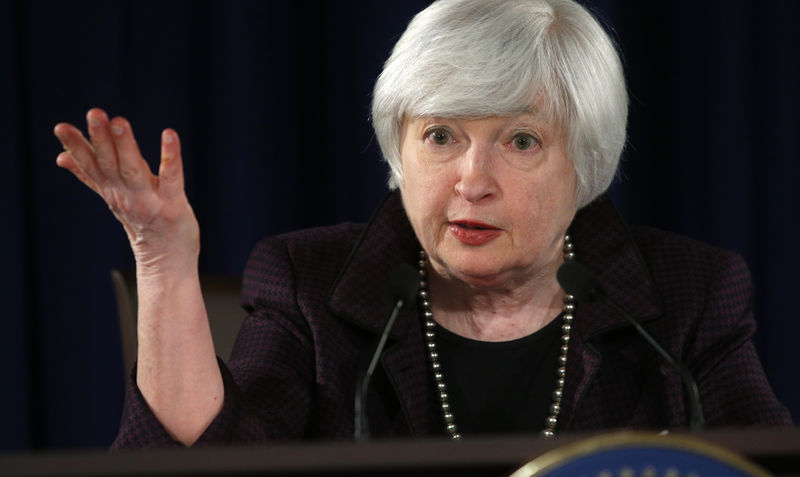By Michael Flaherty and Emily Stephenson
WASHINGTON (Reuters) - The U.S. Federal Reserve is lobbying to stem a rising threat to its independence as the "Audit the Fed" movement, once seen as usual background noise, looks set to gain momentum in 2015 when Republicans gain control of both houses of Congress.
Interviews with current and former Fed staff, lawmakers and lobbyists show that the central bank, led by Chair Janet Yellen, is taking the audit threat seriously. Fed officials are making their case for independence across Capitol Hill, reminding politicians of the damage that can come from political interference into economic policy discussions.
"They're sensitive to all of these issues," said Senator Jack Reed, a Rhode Island Democrat on the Senate Banking, Housing and Urban Affairs Committee. Reed said he had met with Fed Governor Daniel Tarullo in recent weeks but would not say what they discussed.
The Fed is subject to various audits, including reviews by the Government Accountability Office (GAO). But since 1978, its monetary policy discussions have been legally exempt from a GAO audit and some politicians say it is time to open up those deliberations to more public scrutiny.
The Fed fears that a full GAO audit would reveal too much detail of monetary policy decisions made by the Federal Open Market Committee. Fed officials have said such exposure would complicate their public communication, hurt their credibility and stoke market volatility.
The central bank's stance on the issue was on display Wednesday, when Yellen was asked if she was worried about the Fed's independence. Yellen reiterated it was important to keep short-term political interests out of Fed policy decisions.
"I certainly hope that (the GAO exemption) will continue and I will try to forcefully make the case to why it is important," she said.
But Fed officials realize that boosting transparency has broad support, which is expected to grow as both Republicans and Democrats push for greater scrutiny over the central bank, its $4.4 trillion balance sheet, its regulatory powers and its plan to begin raising interest rates.
While it remains to be seen if the Senate will take up the audit cause in 2015, Fed officials are actively lobbying.
KEY TASK
Loretta Mester, Cleveland Fed President since June, said she has met with lawmakers since taking the job, discussing independence and other topics. Meeting lawmakers will be a key task and regular part of the job, she said.
"It's important for the Fed to be independent in its setting of monetary policy," said Mester, adding that the central bank is accountable to Congress and the American people. "We want to be non-political in terms of how we evaluate monetary policy because it actually leads to better policymaking."
Fed Chair Yellen and other Fed officials, including half a dozen of its legislative affairs staff, regularly meet with lawmakers on Capitol Hill. From March to September, Yellen formally met or spoke with 15 U.S. lawmakers, according to her meeting calendar, made public by the Wall Street Journal through a freedom of information request.
That routine is likely to intensify next year, according to Mark Calabria, a director of financial regulation studies at the Cato Institute think tank.
"I would expect a lot more outreach on Yellen's part, a lot more lunches, particularly to the Senate banking committee and the new members."
In September, the House passed a bill that would require a full GAO Fed audit, reviving a 2012 measure. The "Federal Reserve Transparency Act," passed the House by a 333-92 vote in September, but died in the Senate.

"The likelihood of re-introduction of the audit bill is essentially 100 percent," said Calabria, a former staffer for Alabama Senator Richard Shelby, who is expected to take over as new Senate banking chair. "The question is whether both the House and Senate pass it in its current form. Certainly the odds of it passing have greatly increased."
(Additional reporting by Ann Saphir and Jonathan Spicer; Editing by Tomasz Janowski)